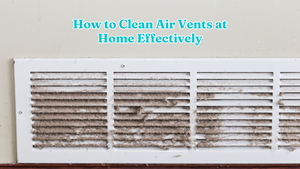Ever look at your vents and say to yourself, "I bet those haven’t been cleaned in ages”? You’re not alone. Dirty home air vents aren't just ugly to look at—they can clog up air, lower HVAC performance, and trigger allergies.

Don't worry: with a few easy steps and some basic tools, you can clean your HVAC vents like a pro.
Why Clean Your Air Vents?
- Improve airflow at home – Dust build-up blocks the air your HVAC system pushes out.
- Reduce airborne dust and allergens – Cleaner vents mean fewer particles floating around.
- Boost energy efficiency – Your system works smarter, not harder.
- Extend HVAC lifespan – Cleaner components wear down less quickly.
DIY Air Vent Cleaning: What You’ll Need
- A soft-bristle brush or toothbrush
- Vacuum with brush attachment
- Clevast compressed air duster (great for dusting out dust from vents and small crevices)
- Damp microfiber cloth
- Screwdriver (if covers must be removed)
Step-by-Step: How to Clean Home Air Vents
1. Turn off the HVAC system

Safety first. Be sure the air's off before beginning to clean.
2. Remove covers from vents

Use a screwdriver if necessary. Set them on a towel to clean.
3. Dust covers

Vacuum or brush off surface dust with a soft brush or vacuum. Use a damp cloth to wipe away persistent grime.
4. Compressed air blow-out of ducts

Utilize the Clevast compressed air duster to blow high-pressure air into duct inlets. It loosens up dust deep within so that it may be sucked up or settle elsewhere without any damage.
5. Vacuuming around the vent inlet

After loosening dust, vacuum around the perimeter and duct opening.
6. Clean everything down

Wipe clean the vent cover with a damp cloth and allow it to dry before reinstalling.
7. Reinstall and turn it on

Replace the cleaned vents and enjoy increased airflow.
Helpful Tips for Cleaner Air & Better Flow
Repeat this every six months, preferably ahead of heating and cooling seasons.
- Maintain fresh air filters—replace or clean every 1–3 months.
- Install an air purifier or moisture absorber to minimize dust recirculation.
- Keep vents open—don't obstruct them with furniture or rugs.
When to Call a Professional
If you:
- Notice mold or chronic mildew
- Have insect droppings in the ductwork
- Notice musty smells even after cleaning
… it's time to hire professional duct cleaning. Extensive contamination requires expert attention.

